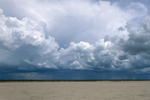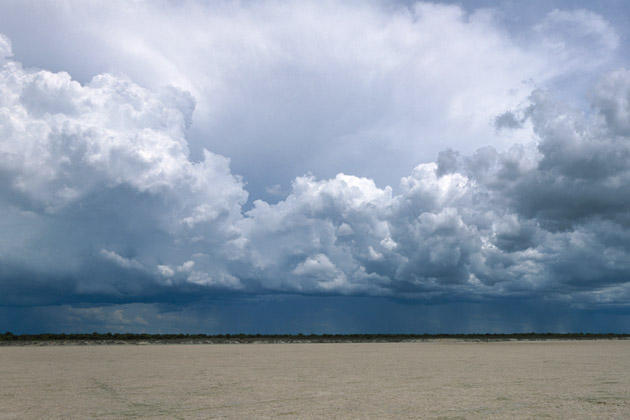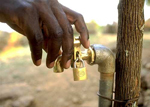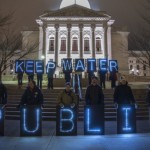Will Namibia’s Newfound Wealth of Groundwater Serve People or Mining?
Africa faces challenges getting at its newfound groundwater
By James Anderson
Alertnet
Walvis Bay, Namibia — Parched and angry, a crowd of women gathers at the water collection point in Walvis Bay. This dusty fishing town on the Atlantic coast is in water crisis mode, again, after massive floods swept away the electrical lines that power the city’s pumps and boreholes.
This scene plays out on a regular basis in this desert country, which is one of Africa’s driest. It also illustrates a key problem with this continent’s relationship with water: it is always in the wrong place at the wrong time.
Now, the discovery of massive, ancient aquifers in Namibia has inspired optimism among scientists.
“The water volumes could supply the densely populated northern region of Namibia for about 400 years at current supply volumes,”
reported Martin Quinger, the investigating hydrologist from the German federal scientific institute for geosciences and natural resources.
Quinger and his team predict that the new discovery will promote development, improve living standards, and provide a buffer against climate change.
The announcement follows on the heels of a publication in April by the British Geological Survey and University College London, which identified massive reserves of “fossil water” across the continent, perhaps as much as 100 times the amount available on the surface.
Lead hydrologist Alan MacDonald, of the British Geological Survey, noted in an email that
“there are still approximately 300 million people in Africa without access to clean water (and) most of these folk live in isolated rural areas. There is growing evidence that access to a reliable drinking water supply has a large impact on health and poverty reduction.”
The numbers are impressive. Namibia’s newly discovered aquifer covers a wide area of 70 kilometers by 40 kilometers (44 miles by 25 miles). Total groundwater in Africa may add up to a staggering 0.66 million cubic kilometers – at least 100 times the amount of annually renewable freshwater on the continent – and new community wells may be drilled for as little as $6,000 each, MacDonald said.
But Africa’s groundwater may have a long journey before it reaches the lips of those who need it. The continent faces an uphill battle in determining how to access groundwater, leverage it for economic growth, and sustain it for the next thirsty generation, experts say.
Investment, expertise shortages
In order to extract groundwater, communities need boreholes, pumps, and pipes, not to mention storage and treatment facilities for urban distribution systems.
“The main issues are getting the investment, the right technical expertise to site and drill wells, and then getting serious about maintenance and reliability – currently about 30 percent of wells in Africa are not functioning,” MacDonald said.
At Namibia’s recent annual water conference, the Ministry of Agriculture, Water and Forestry estimated that Namibia needs $3.7 billion Namibian dollars (almost $450 million) investment in water infrastructure to meet growing demand.
Moreover, the government will likely foot the bill. In a continent dominated by large state-owned utilities there is little private investment or local entrepreneurship in water resources.
Governance issues are also a concern. Many of the countries with the biggest new water discoveries – Libya, Algeria, Egypt and Sudan – have seen upheaval or strife in their political and legal systems. Water ownership is notoriously tricky to begin with, as resources stretch under and over property lines, and extraction at one site means less water in another.
Even in relatively well-governed Namibia, current law is murky when it comes to the siting and permitting of new boreholes.
Although competition for groundwater is unlikely to be an issue with rural hand-operated pumps, the large extractions required by Namibia’s growing mining industry could be a problem.
Thinking ahead
Even an aquifer with 400 years’ worth of water faces the risk of eventual shortages. While MacDonald and others note that sustainability shouldn’t be an issue for the modest withdrawals required for rural water use, Africa’s population is expected to grow to 2 billion people by 2050, and urban water supply will be a challenge.
Additionally, climate change is already beginning to hit Africa hard, and variable and unpredictable weather conditions are likely to strain surface water resources, experts say.
Despite the challenges moving forward, researchers say the new water discoveries are good news when it comes to fighting food insecurity and adapting to climate change in Africa. With the right support and proper planning, they say, groundwater can help bolster agriculture, jump start industry, and potentially save millions of lives in times of drought.
Sources: Haiti Chery | Alertnet | James Anderson writes on water, forestry and mining issues. He previously worked at the Gobabeb Training and Research Centre in Namibia on desert ecology and hydrology research.









Comments
Will Namibia’s Newfound Wealth of Groundwater Serve People or Mining? — No Comments